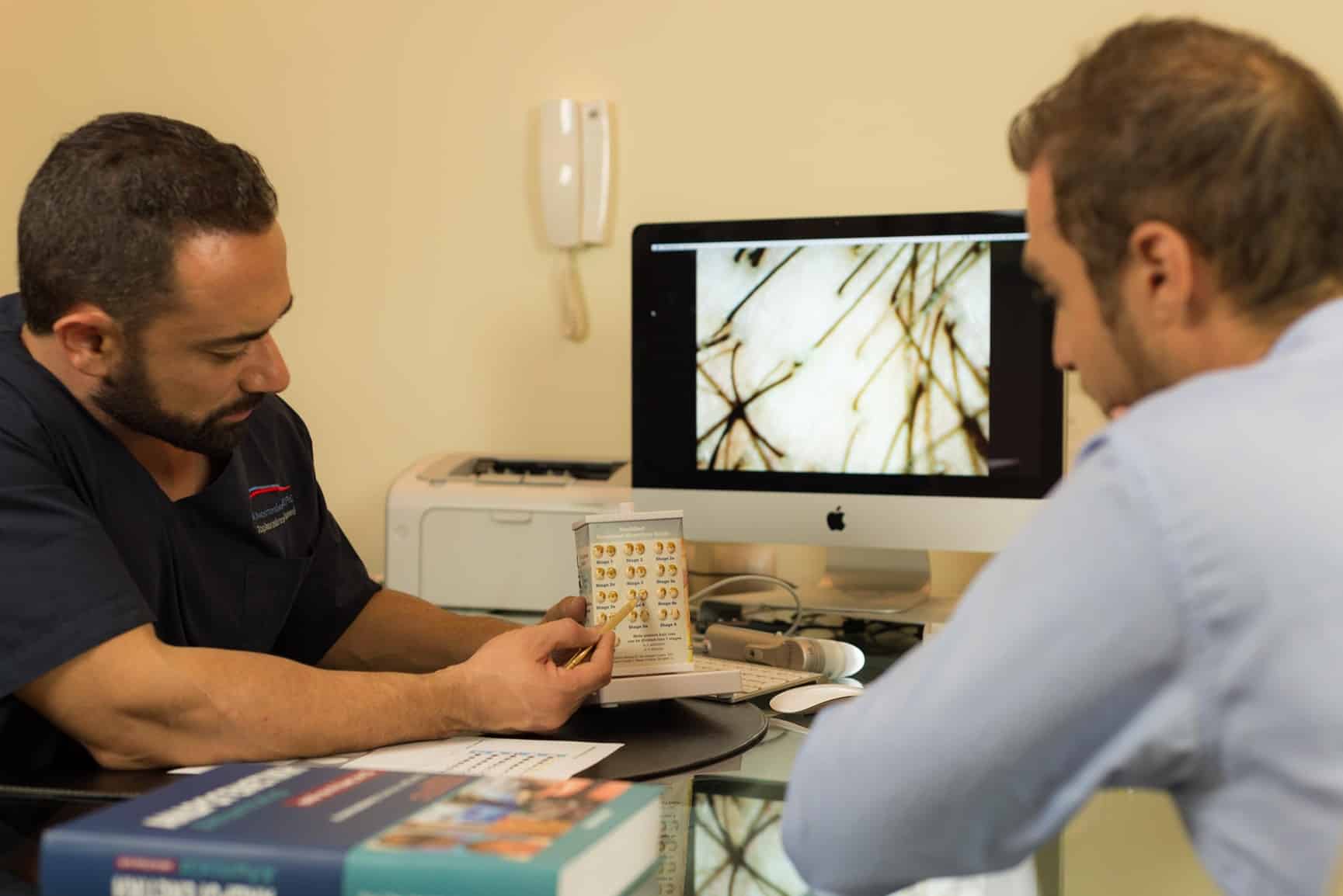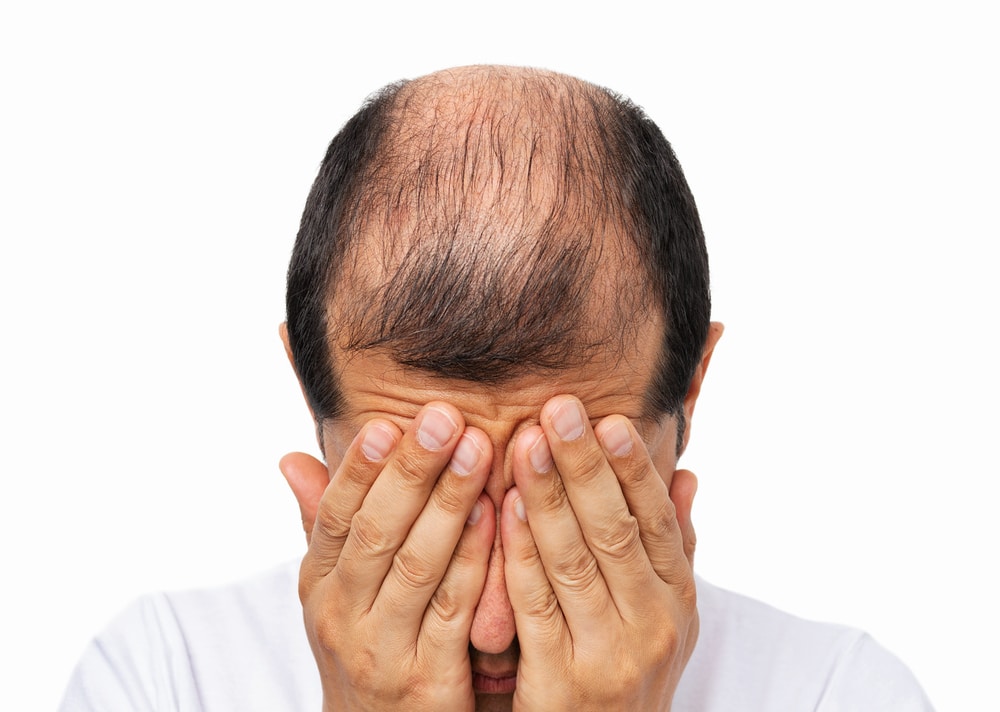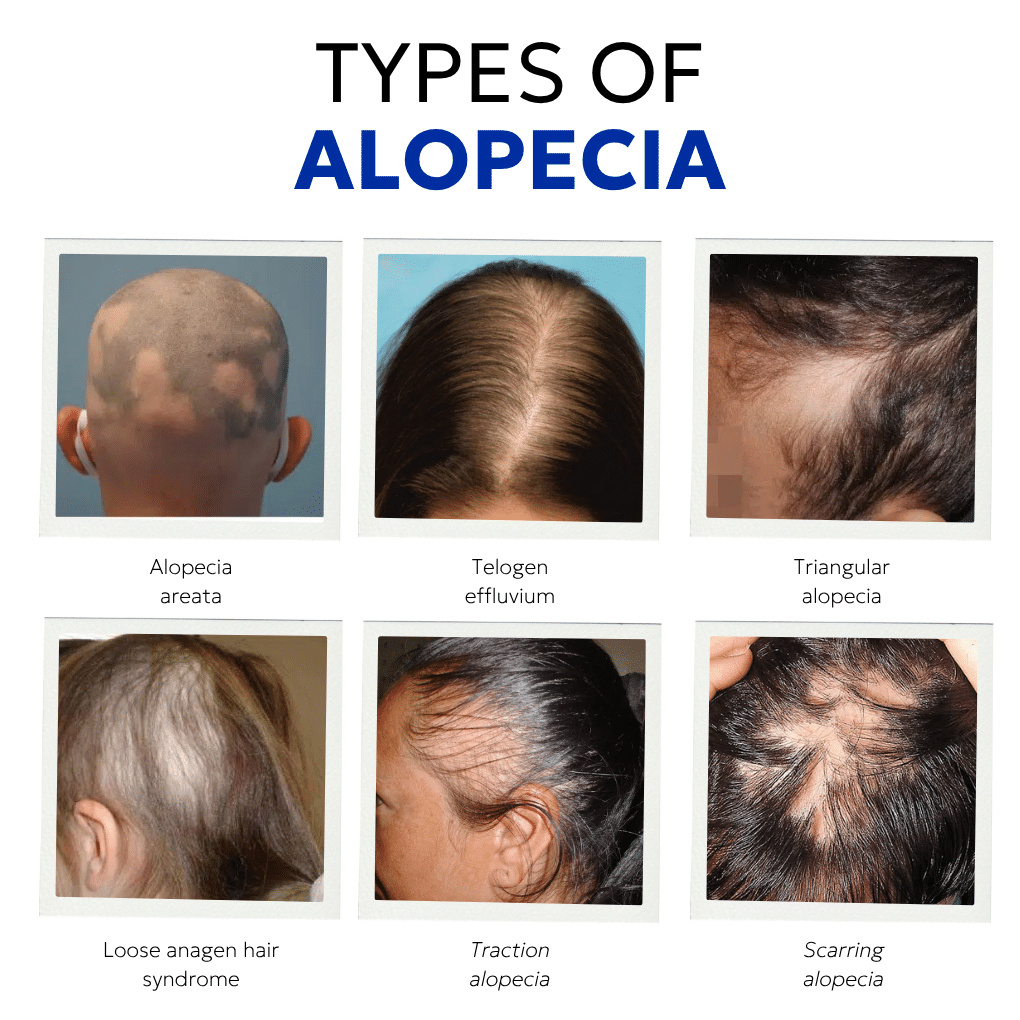Is Stress Really a Contributing Factor to Hair Loss? How Exactly Are Hair Loss and Psychology Connected?
Those who do not experience hair loss often underestimate or dismiss the significance it holds for those affected, sometimes considering their concern exaggerated or unjustified. However, especially for young individuals dealing with hair loss, the condition can have profound psychosocial impacts.
Hair loss and psychology are closely intertwined, as stress actively contributes to hair shedding and thinning. Chronic stress triggers biological responses that can accelerate hair loss, affecting not only the hair’s density but also the emotional well-being of the individual.
Understanding this connection is vital for a holistic approach to treatment, addressing both the physical symptoms and the psychological effects of hair loss.
The Hair Loss Treatment Industry

The Importance of Hair and the Hair Care Industry
The significance of hair to people is evident from the vast array of cosmetic hair care products available today. No other part of the human body receives as much attention and care as hair does. Shampoos, conditioners, creams, lotions, dyes, gels, hairsprays, mousses, brushes, combs — literally hundreds of hair care products and accessories make up a global industry worth billions, all fueling the vanity of people worldwide.
The hair loss and unwanted hair removal industry generates billions of dollars annually, with a significant portion of that revenue spent on promoting and advertising ineffective treatments targeting the panic of those witnessing their hair thinning or falling out.
Studies dating back to the 1970s have reached a universally accepted conclusion: hair significantly influences a person’s image and whether they are perceived as attractive and presentable. Furthermore, it has been proven that individuals considered attractive—according to the prevailing standards of their culture and era—enjoy notable advantages in interpersonal interactions.
Conversely, those deemed unattractive, especially individuals suffering from dermatological conditions, often face disadvantages in social opportunities and may sometimes be marginalized by others.
One can thus appreciate the vital role appearance plays in both genders, particularly in forming the crucial “first impression.” The primary reason why people strive to look their best is the conscious or unconscious understanding that their appearance profoundly shapes their personal relationships.
Androgenetic Alopecia and Stereotypes

When exploring such a sensitive topic, it is important to identify the origin of the psychological impact of hair loss, as well as the differences between the sexes. Hair loss itself, particularly androgenetic alopecia, is a biologically benign condition that, although it alters an individual’s appearance, does not have any pathological effect or significance on its own.
Behavioral science views androgenetic alopecia as a social signal that indicates adulthood and maturity in men. The “social signal theory” is supported by numerous image manipulation experiments, where men with androgenetic alopecia are consistently perceived as older compared to photographs of the same men with hair. What is certain, however, is that androgenetic alopecia does not reflect an individual’s physical or mental strength, intelligence, character, or reproductive capability.
Nevertheless, the profound impact it can have on an individual’s psychological and social expressions, as well as on their quality of life, stems solely from the appearance standards that people inherently possess and cultivate through social influences.
Such stereotypes dictate that, for a man to be considered attractive, he must be tall, strong, athletic, and have a full head of hair—equating attractiveness with goodness—while for a woman, being beautiful, slim, and smiling equals attractiveness and goodness. When these conditions are not met, there is a tendency to attribute negative traits to those who are perceived as unattractive, just as we readily attribute positive traits to those who are considered attractive.
Thus, a man who is short, overweight, or bald is often unfairly labeled unattractive or undesirable—essentially “bad”—while women who do not meet cultural beauty standards are stigmatized as unattractive, “ugly,” or undesirable, often being implicitly labeled as “bad women.”
Unfortunately, the unconscious power of these stereotypes is so strong that it significantly influences behavior, leading us to be overly lenient and sometimes unjustifiably kind to attractive people, while being excessively harsh toward those less attractive. Indeed, hundreds of studies have demonstrated that those who are less attractive tend to face disadvantages in interpersonal interactions across the board.
Psychological Effects of Androgenetic Alopecia in Men
Androgenetic alopecia does not only affect social perceptions. It also has a significant impact on the quality of life and overall well-being of those affected. While research on the “psychology of appearance” is extensive, few studies until the 1990s focused specifically on the potential effects of androgenetic alopecia on interpersonal relationships. Even these studies mainly relied on empirical observations about “first impressions.”
In an early study by Roll et al. in 1971, sketches of men with and without androgenetic alopecia were shown to women, who were then asked to judge the men in the drawings. Men with mild androgenetic alopecia were perceived as weaker, less active, and less capable. Those with advanced androgenetic alopecia were judged as less kind, less attractive, harsher, and even “bad.” Conversely, men without androgenetic alopecia were seen as energetic, capable, and visually appealing.
A similar study by Moerman in 1988 found that men with extensive androgenetic alopecia were perceived to be on average 10 years older than men without hair loss, and were also seen as less attractive. However, they were rated as more stable, intelligent, and conscientious, whereas men without androgenetic alopecia were considered younger, more attractive, and more pleasant.
In another study by Butler et al., involving 96 university students, photographs of the same man were shown—one with a full head of hair and one with extensive androgenetic alopecia. The analysis showed that in the photo with full hair, the man was rated as more dominant, dynamic, and masculine. The only characteristic not influenced by hair status was perceived intelligence. In all other assessed traits, men with androgenetic alopecia were rated lower compared to men without hair loss.
Beyond others’ perceptions, men with androgenetic alopecia often have a notably negative self-image. When asked about their own feelings, many reported feeling older, less attractive, and weaker—sometimes at even higher rates than those observed by non-affected groups in earlier studies.
It appears, therefore, that men with androgenetic alopecia commonly experience reduced self-confidence and negative self-perception. These findings are supported by a recent study by Karaman et al., involving 252 men (175 with androgenetic alopecia and 77 without), evaluated via a 33-question survey. Results revealed a shared negative view of the psychological and social impact of androgenetic alopecia, with 76.9% expressing interest in pharmaceutical treatments for hair loss.
Social Anxiety Associated with Hair Loss
A recent study by Budd et al. involving 1,717 men from four European countries found that the more advanced the stage of androgenetic alopecia, the greater the social anxiety experienced by the men. This included worries about aging, attractiveness, and a feeling of helplessness against hair loss. Correspondingly, their self-confidence in their overall appearance decreased. Their preoccupation with hair loss often bordered on obsession, with concerns about how noticeable their hair loss was to others and efforts to conceal it in various ways.
A study by Cash on 604 men across six countries showed that 75% were moderately to extremely dissatisfied with their hair appearance, while only 4% reported no impact. Most reported undertaking 2 to 5 actions to manage or halt hair loss, such as changing hairstyles, using cosmetic products, pharmaceutical treatments, or hairpieces.
The intensity of obsession with hair appearance, monitoring hair loss, comparing oneself to others, and social teasing or ridicule increases with the severity of hair loss. Notably, 45% of men with moderate and 79% with extensive androgenetic alopecia have experienced annoying jokes or comments about their baldness. Some view these comments as good-natured, while others find them deeply offensive.
Girman et al.’s 1998 study, which included men who had not yet sought medical advice, found similar results, with the psychological impact inversely related to the age of onset—the earlier the hair loss began, the stronger the psychological effects.

“Table 1: Negative emotions experienced by patients with AA (from Hadshiew et al., 2004)”
When Does a Man Start Worrying About Hair Loss?
However, most of these men have not sought treatment for androgenetic alopecia—perhaps to avoid appearing vain, due to potential discomfort during medical consultations, or simply because they are unwilling to admit their concern about hair loss. A recent study by Passchier et al. revealed that the period of greatest emotional distress for patients occurs when they first notice thinning of their hair due to androgenetic alopecia (see Figure 1).

This Paradoxical Phenomenon and Its Psychological Impact
This paradoxical phenomenon has also been observed in other medical conditions that tend to worsen over time and can be explained by an individual’s tendency to accept an initially severe condition as “inevitable.” In contrast, milder or benign conditions often leave room for hope, which may gradually give way to despair and ultimately resignation when no improvement or solution is found. The psychological impact of androgenetic alopecia, however, is not uniform. Many men remain largely unaffected by it, viewing it as a natural and minor aesthetic concern. Conversely, there are individuals predisposed to psychological consequences related to androgenetic alopecia.
Those predisposed share common characteristics, including:
- Μen experiencing early-onset androgenetic alopecia, typically under the age of 26,
- Emotionally unattached individuals without a stable or permanent relationship,
- Individuals who perceive their hair loss as noticeable to others and believe it will continue,
- Those with a well-developed social image,
- Individuals with a high investment in their appearance,
- People with a sensitive sense of self-acceptance.
The younger the individual with androgenetic alopecia, the more vulnerable they are to diminished self-esteem, feelings of reduced attractiveness compared to their peers, social withdrawal, and even mild personality disorders. Studies have shown that personality disorders appear in approximately 74% of patients with early-onset androgenetic alopecia, compared to only 10.3% in the general population.
Furthermore, these individuals are more likely to experience anxiety, distress, and obsession over the potential future loss of their hair, as demonstrated in a study by Luxon et al. The typical psychological response in men suffering from androgenetic alopecia includes dissatisfaction with their overall body image, feelings of inadequacy and premature aging, which in turn negatively affect their self-confidence and self-esteem.
These emotions worsen with the inevitable progression of androgenetic alopecia (see Table 2). Consequently, the quality of life for many affected individuals is significantly impaired. Williamson et al., in a study using the Dermatology Life Quality Index, found that patients with androgenetic alopecia scored comparably low to those suffering from severe psoriasis. Remarkably, a broad online survey conducted by America Online revealed that 25% of men with androgenetic alopecia would be willing to trade five years of their future life to regain their lost hair.
It is evident that for a substantial portion of those affected, the psychological consequences of androgenetic alopecia can be severe, with only a minority remaining unaffected. Social stereotypes that dictate men should not care—or at least not openly show concern—about their appearance add an extra layer of psychological burden. These men risk being labeled vain, superficial, narcissistic, or shallow simply because they care about their hair.
This creates a vicious cycle of dissatisfaction with hair loss and repression of that dissatisfaction, increasing psychological stress on the modern man. Unfortunately, this often leads to the pursuit of unreliable and sometimes fraudulent treatments in desperation.

Men’s Need to Address Hair Loss
The desire of men to seek ways to reverse the signs of aging and the passage of time has long been a subject of study in contemporary psychology. The narcissistic perception of the “wound of aging” drives many men to pursue “rejuvenating measures.” The cost of this desperate attempt to fend off the inevitable signs of aging is often high, as men find themselves paying for products and services, while also enduring potential side effects from the treatments they use. A deeper examination of the underlying causes of this behavior may lead to unsettling conclusions.
Excessive preoccupation with physical appearance, the so-called “youth fetishism,” and the denial of natural maturation—and, by extension, mortality—are essentially pathological states of internal alienation. Notably, this condition has been referred to as the “Dorian Gray Syndrome,” named after Oscar Wilde’s famous novel, in which the protagonist sells his soul to the devil to avoid aging forever.
On the other hand, some men develop healthy coping strategies to manage the psychological stress caused by androgenetic alopecia. These include seeking evidence-based medical treatments, attempting to conceal hair loss through suitable hairstyles or haircuts, working to overcome obsessive thoughts about hair loss, and engaging in activities that improve physical fitness and restore a positive self-image. Such adaptive responses enable men with androgenetic alopecia to preserve their integrity and maintain the functional stability of their character.
A study by Alfonso et al. involving 1,536 men from the five largest European countries revealed that only 10% actively sought solutions for androgenetic alopecia. Among those who experienced some degree of treatment efficacy, significant improvements were noted in self-confidence, self-image, and quality of life. Similarly, research by Karaman et al. found that men’s concern with androgenetic alopecia inversely correlated with their economic status, suggesting that various social factors may help mitigate the loss of self-esteem caused by androgenetic alopecia.
Managing Androgenetic Alopecia and Its Impact on Mental Well-being
Individuals experiencing thinning hair—regardless of gender—struggle to cope with the anxiety and, at times, the despair that arises from their condition. They worry that their appearance will worsen, irreparably affecting their social image and acceptance. They seek ways to halt or even reverse the inevitable progression of androgenetic alopecia in order to restore the integrity of their self-image.
The unpredictable nature of androgenetic alopecia, coupled with an incompletely understood cause and limited treatment options, leaves patients with little psychological room for adjustment. Even those with minimal hair loss carry a significant emotional burden—a reality that neither physicians nor close social circles should ignore or underestimate. The true measure of treatment success is not solely the number of hairs retained or regrown but also the overall improvement in the patient’s quality of life. Psychological support is therefore invaluable in helping some patients come to terms with their condition and regain their self-confidence.
Those who eventually pursue treatment for androgenetic alopecia are typically the ones most distressed by it. Some men attempt to conceal signs of thinning in what might be considered a paradoxical manner, such as shaving their heads, while others resort to any “remedy” recommended by acquaintances or strangers, experts or otherwise. Unfortunately, many who experience hair thinning initially fall victim to irresponsible, irrelevant, or even exploitative advice. Only those with sufficient psychological resilience will seek professional, reliable, and responsible diagnosis and guidance—ultimately reaching a specialist physician.
Patients who turn to experts tend to have realized that unapproved treatments are ineffective against hair loss and fail to alleviate their psychological distress. The primary factors motivating individuals with hair loss to consult a dermatologist have been shown to be: concern over worsening hair loss (82%), the desire and need to seek expert advice (85%), the need to find an effective treatment (75%), and dissatisfaction with the ineffectiveness of non-pharmaceutical products.
Patient expectations of their physicians are not always met. Studies show that one in four patients remains dissatisfied with their doctor’s management of androgenetic alopecia. Key sources of dissatisfaction include the absence of a prescribed treatment plan (66%), the physician’s refusal or inability to answer questions (54%), and the perception that the doctor does not give adequate importance to the patient’s concerns (52%).
Treatment approaches for androgenetic alopecia may include any combination of the following:
- Prevention of further hair loss,
- Preservation of existing hair,
- Stimulation of regrowth and maintenance of new hair.
The Importance of Prevention in the Management of Androgenetic Alopecia

Most of the time, preventing the progression of androgenetic alopecia and maintaining existing hair is the most realistic approach—something well understood by every physician specializing in hair loss. However, contrary to the common belief among doctors that patients primarily want to “regrow hair,” a multinational study of 2,200 men aged 20-26 revealed that 61% are primarily interested in preserving their current hair, with fewer expecting significant new hair growth.
The two approved pharmacological treatments for androgenetic alopecia are topical Minoxidil and oral Finasteride. Extensive studies on both medications have included not only the physician’s objective assessment of treatment efficacy but also the patient’s personal evaluation of their condition. In most of these studies, results fell short of patient expectations, yet satisfaction levels remained significant. Men with hair loss reported satisfaction with their hair’s appearance, even if there was no notable improvement in self-esteem, depression, or social perception.
Regarding hair transplantation, patient motivation plays a crucial role in their subsequent satisfaction with the outcome. Those motivated by a desire to improve their personal image tend to have better results than those whose motivations are to please others or to increase romantic prospects.
Expectations also play a critical role in treatment outcomes. Patients with unrealistic expectations, hoping for dramatic results in a short time, often become disappointed and tend to discontinue medication or request additional follicular unit extraction sessions before the results of the initial procedure are fully realized.

Beyond Treatment: Addressing the Psychological Impact of Androgenetic Alopecia
Physicians should remain vigilant in diagnosing not only the physical symptoms of androgenetic alopecia but also the psychological signs that may accompany this condition. When necessary, patients should be referred for psychological support to help manage the emotional burden of hair loss.
SUMMARY:
The unpredictable nature of androgenetic alopecia, with its unclear causes and limited therapeutic options, leaves patients with little room for psychological adjustment. Doctors treating patients with androgenetic alopecia must be fully aware of the psychological impact hair loss can have. It is their responsibility to help patients understand both the condition itself and their emotional response to it. Most patients are already well-informed about the causes of hair loss and have tried various methods to halt its progression. Their expectations from their physician tend to be specific and high. Providing clear information, guidance, and treatment options are essential strategies that greatly improve the patient’s psychological well-being, fostering trust and helping them come to terms with their condition. If you are experiencing hair loss, the first step is to consult a specialized physician. At our clinic, we offer expert care in hair loss treatment, utilizing the latest and most reliable methods for both non-invasive androgenetic alopecia management and hair transplantation. Since 2004, we have delivered outstanding transplantation results to hundreds of patients, employing a wide range of advanced techniques including FUT, FUE, and others.
Call us today or book a free online consultation to learn about hair transplant costs and to develop a personalized, up-to-date strategy for comprehensive hair loss management based on the latest advancements in modern medicine.











